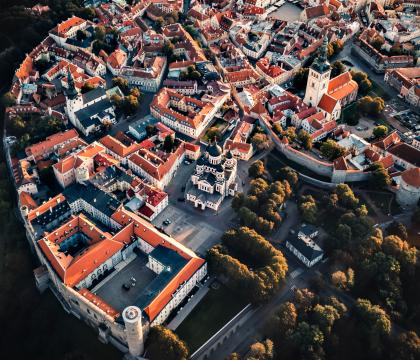2024-2025 Graduate Baltic Short-Term Travel and Research Grant (Spring/Summer Quarter)
The Center for Russian, East European, and Eurasian Studies (CREEES) invites applications for travel grants for short-term study and research trips between May and August to Estonia, Latvia, Lithuania, and the Baltic Sea Region. (For trips between December and May, please apply for the Winter/Spring opportunity.)
Since the break-up of the USSR, the Baltic states have been transformed into vibrant Western democracies and become member states of the European Union and NATO. The countries are well-known for political and economic freedom, superior educational systems, minimal corruption, and technological innovation. Considering the current fragile state of relations between the Western world and Russia, the study of the Baltic region has become more topical and important than ever.
The grants will be awarded to Stanford University’s graduate students who are engaged in Russian and East European/Baltic studies and wish to travel to the Baltic region to attend conferences, conduct research, and participate in academic exchange with local faculty and students. Possible areas of research include the history, politics and culture of the Baltic states and region; international relations between Russia, the EU, and the USA; foreign and domestic policy and development of Estonia and the Baltic states; and e-governance, digital transformation, and (cyber) security.
The $5,000 travel grant can be used to cover travel and living expenses associated with a 1–3-week trip.
The student may be hosted by Tartu University’s Johan Skytte Institute of Political Studies (Tartu), Tallinn University of Technology's FinEst Centre for Smart Citites (Tallinn), and/or Vabamu Museum of Occupations and Freedom (Tallinn). Other (co-)hosts will be considered, depending on the student’s interests and goals.
The student may wish to engage in the following activities during their trip:
-
Tartu University’s Johan Skytte Institute of Political Studies (Tartu, Estonia) invites the student to engage in its academic programs and connect with its faculty and students. Potential topics may include regional security, foreign and domestic policy, e-governance, and the reindependence process of the Baltic region. The Skytte Institute is prepared to host a seminar/colloquium for the student to discuss their research/study project and facilitate contacts between the student and Tartu University’s faculty and students. The student is invited to attend the annual Tartu University’s Conference on East European and Eurasian Studies, which takes place from June 11-13, 2025 in Tartu, Estonia.
-
The Estonian Song and Dance Festival takes place from July 3-6, 2025 in Tallinn, Estonia and constitutes an important event to attend by those looking into the region's cultural history, song and dance traditions, and the reindependence movement of the late 1980s and early 1990s. The student would be invited to attend a special program of events and activities before and during the Song and Dance Festival, curated by Vabamu Museum of Occupations and Freedom (Tallinn, Estonia).
-
FinEst Centre for Smart Cities (Tallinn University of Technology) invites the student to join the continuous process of matching long-term city challenges (e.g. urbanization, climate change) with ideas on how to solve them in the urban environment via research and innovation actions (pilots). If successful, those pilots aim to transform European cities of becoming climate-neutral and smart by 2030. The Centre invites the student to participate in its annual Smart City Exchange Forum, scheduled for March 13, 2025.
-
Carry out archival research at the National Archives of Estonia and/or at libraries and museums;
-
Visit Tartu University’s Narva College and immerse in the local Russian-speaking community and culture of the border city.
In order to apply, please submit the following documents:
-
CV/resume and 1-page statement of purpose detailing the interests of the student and the goal of the trip;
-
Timeline and travel budget.
Application deadline: February 15, 2025
For trips between December and May, please apply for the Winter/Spring opportunity.
